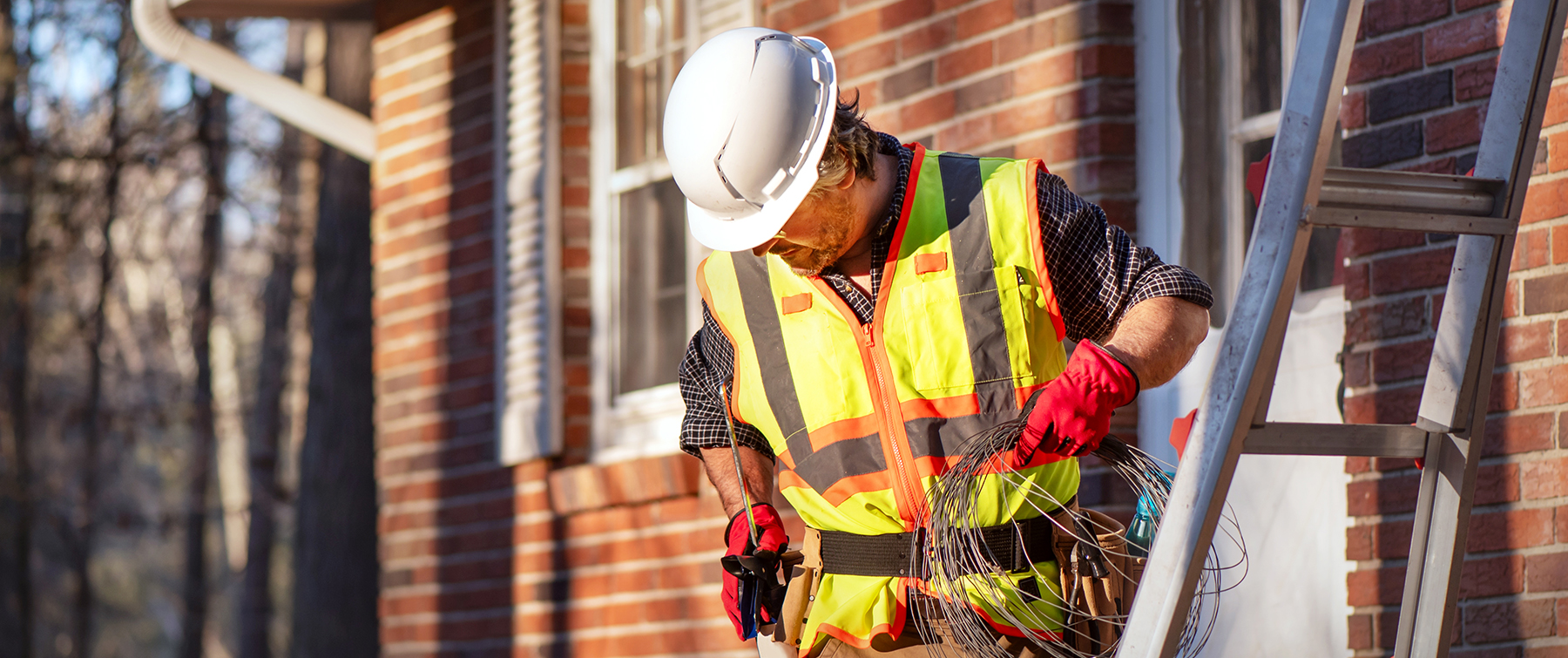Electrical Safety
At Central Hudson, your safety and reliable energy service are our top priorities. Through ongoing infrastructure improvements and specialized employee training, we ensure the secure and efficient delivery of your power while protecting the dedicated teams who work behind the scenes. Follow these essential safety guidelines to help keep yourself, your home, and your community safe.

Safety Near Overhead Power Lines
If you plan to do work within 10 feet of electric lines (including service lines), complete the Overhead Electric Protection Notification Form or call us at (845) 452-2700 before proceeding.
Stay Safe Around Overhead Lines:
- Identify all overhead power lines before working near them.
- Maintain at least 10 feet of distance between yourself, equipment, and power lines.
- Avoid touching any object that is in contact with a power line.
- Take caution around fencing near power lines.
- Always carry ladders and equipment horizontally to prevent accidental contact.
- Lower equipment apparatus before moving or driving.
- Never spray water near power lines.
- If a power line falls, stay at least 30 feet away.
Safety Near Downed Power Lines
Downed power lines can carry deadly electric currents and pose serious risks. If you encounter one, follow these steps:
What to Do:
- Move away from the power line and anything in contact with it. The ground around the line may be energized.
- Call 911 immediately. Central Hudson will dispatch emergency responders to resolve the issue.
- Keep at least 30 feet away from downed lines at all times.
- Shuffle away with small steps, keeping both feet on the ground. This reduces the risk of electric shock.
What NOT to Do:
- Do not attempt to move the power line or any object touching it. Even non-conductive materials like wood or cloth can carry electricity if damp.
- Never assume a power line is inactive. Treat all downed lines as live.
- Stay away from water near downed lines—it may be electrically charged.
- Do not drive over a downed power line.
- If a power line falls onto your car, stay inside and signal for help. Do not touch the ground and the car at the same time.
- In case of fire, jump clear without touching the car and the ground simultaneously, then shuffle away carefully.
Indoor & Outdoor Electrical Safety
| Category | Safety Tips |
| Indoor Electrical Safety |
Protect Your Home & Appliances: Ensure high-power appliances have separate circuits; consult an electrician. Always purchase UL-labeled appliances and power tools with three-pronged plugs. Unplug appliances before cleaning or repairing them. Turn off appliances when leaving home or when unattended. |
|
Watch for Electrical Issues: Frequent tripped circuit breakers may signal overload or faulty appliances—contact an electrician. Overheated cords or outlets indicate inadequate wiring—have them checked. Use safety covers or tamper-resistant receptacles (TRRs) for outlets if children are in the home. |
|
|
Cord Safety: Keep loose cords away from walking areas, especially near children and pets. Discard damaged cords—never patch them with tape or run under rugs, radiators, or heaters. Do not overload outlets with too many devices. Always use properly rated cords for appliances. |
|
|
Water and Electricity Don’t Mix: Never use electric appliances while standing in water. Avoid handling electrical cords with wet hands. Use GFI outlets for appliances near water sources like bathrooms, kitchens, and pools. |
|
| Outdoor Electrical Safety |
General Precautions: Downed wires can still be energized and dangerous—stay away and call Central Hudson immediately. Teach children about electrical safety—keep them away from utility poles, fallen wires, and substations. Avoid power lines near trees where children might climb. Never fly kites or drones near power lines. Be cautious of electric meters—they are not toys. Avoid ladders and poles near power lines, even if they’re made of wood. |
|
Safe Use of Outdoor Appliances & Equipment: Never use power tools in wet conditions or while standing on damp ground. Keep electronic devices away from pools, spas, or running hoses. Use only lights and cords rated for outdoor use, including decorative or holiday lighting. Always plug outdoor appliances into GFI outlets. |
|
|
Tree Work & Excavation: If pruning near power lines, hire a qualified tree trimmer. Before digging for landscaping or fencing, contact UDig NY at 1-800-962-7962 or dial 811 at least two days before excavation to locate nearby utility services. |
Electrical Fire Safety
If an electrical fire occurs:
- Call 911 immediately—inform them it’s an electrical fire.
- Never use water to extinguish electrical fires—it may cause electrocution. Use only a fire extinguisher rated for electrical fires or leave the premises.
- If possible, shut off the main breaker to cut electricity to the affected area.
Fire Prevention Measures:
- Install smoke detectors and fire extinguishers throughout your home.
- Regularly inspect and upgrade any faulty electrical systems.
- Conduct fire drills to prepare for emergencies.


